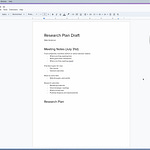Listen now on Apple, Spotify, and YouTube.
—
Alaine is an empathetic UX leader with a proven track record of driving user-centric strategies, adeptly managing teams, and delivering impactful research that drives business growth and strategic alignment.
In her role as a Research Manager at Dext, she oversees research delivery, strategy, and operational functions. With 12 years of extensive experience in user research and design, she is deeply passionate about leading and inspiring individuals while ensuring that customer insights remain at the core of product development.
In our conversation, we discuss:
What happens when a six-person research team shrinks to one and how Alaine rebuilt from there.
Why doing “more research” wasn’t the answer, and stepping back was the most strategic move.
How to spot the right people to advocate for research, even if it’s not your direct manager.
The messy reality of research democratization and what finally made it work.
What it really means to operate as a business partner rather than a user advocate.
Some takeaways:
You can’t research your way out of a broken system. Alaine tried to do everything alone and quickly realized she was burning out while diminishing trust in research. The turning point came when she stepped back to understand what the business actually needed, then rebuilt with that in mind.
Get closer to product, not just users. Alaine shifted her focus toward building relationships with senior product leaders and learning how they think. Reporting into a VP of Product helped position research as part of the product org, not a separate function trying to fight for attention.
Strategic visibility creates pull, not push. Her first hires were two contractors focused on mission-critical work. Once stakeholders saw the quality and impact, demand for research grew naturally. From there, product teams started asking for more researchers, Alaine didn’t need to campaign again.
Democratization isn’t plug-and-play, it’s infrastructure. Initial attempts failed until she simplified tools, rewrote bloated processes, and treated it as a real change management project. Now, 30+ people can confidently run research with a central handbook and lightweight systems built around their needs.
Start with honesty, not idealism. The first step in rebuilding wasn’t a grand vision. It was getting brutally honest about how research was perceived across the company. Anonymous feedback and reflection helped clarify what role the business wanted research to play and that insight shaped every step forward.
Where to find Alaine:
Interested in sponsoring the podcast?
Interested in sponsoring or advertising on this podcast? I’m always looking to partner with brands and businesses that align with my audience. Book a call or email me at nikki@userresearchacademy.com to learn more about sponsorship opportunities!
The views and opinions expressed by the guests on this podcast are their own and do not necessarily reflect the views, positions, or policies of the host, the podcast, or any affiliated organizations or sponsors.




